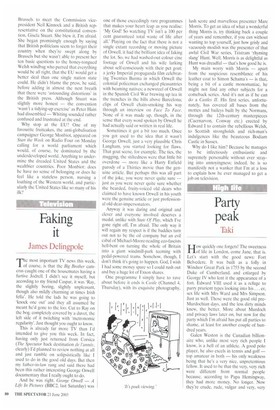Faking it
James Delingpole
The most important TV news this week, of course, is that the Big Brother cameras caught one of the housemates having a furtive Jodrell. I didn't see it myself, but according to my friend Caspar, it was 'Ray, the slightly boring, slightly unpleasant, though also mildly charming at times Irish fella'. He told the lads he was going to 'knock one out' and they all assumed he meant he'd gone to the loo. Cut to Ray on the bog, completely covered by a duvet, the left side of it twitching with 'metronomic regularity'. Just thought you ought to know.
This is already far more TV than I'd intended to give you this week. In fact. having only just returned from Corsica (The Spectator hack destination de l'annie, clearly) I'd planned to review nothing at all and just ramble on solipsistically like I used to do in the good old days. But then my father-in-law rang and said there had been this rather interesting George Orwell documentary that I really ought to do.
And he was right. George Orwell — A Life In Pictures (BBC2, last Saturday) was one of those exceedingly rare programmes that makes your heart leap as you realise: 'My God! So watching TV isn't a 100 per cent guaranteed total waste of life after all.' Playing on the fact that there is not a single extant recording or moving picture of Orwell, it had the brilliant idea of faking the lot. So, we had washed-out colour cine footage of Orwell and his wife larking about self-consciously with their pet goat; a jerky Imperial propaganda film celebrating Twenties Burma in which Orwell the colonial policeman exchanged pleasantries with beaming natives; a newsreel of Orwell in the Spanish Civil War brewing up tea in the trenches in the hills above Barcelona; clips of Orwell chain-smoking his way through an interview on Face To Face. None of it was made up, though, in the sense that every word spoken by Orwell he had actually said or written in real life.
Sometimes it got a bit too much. Once you got used to the idea that it wasn't George Orwell, just a very plausible Chris Langham, you started looking for flaws. That goat scene, for example. The tics, the mugging, the stiltedness were that little hit overdone — more like a Harry Enfield parody of a Thirties movie than the genuine article. But perhaps this was all part of the joke, you were never quite sure — just as you were never quite sure whether the bearded, fruity-voiced old dears who claimed to have known Orwell in his youth were the genuine article or just professional old-dear-impersonators.
Anyway it was daring and original and clever and everyone involved deserves a medal, unlike with State Of Play, which I've gone right off. I'm afraid. The only way it will regain my respect is if the baddies turn out not to be the oil company but an evil cabal of Michael-Moore-reading eco-fascists hell-bent on turning the whole of Britain into a giant windmill-park teeming with pedal-powered trams. Somehow, though, I don't think it's going to happen. God, I wish I had some money spare so I could rush out and buy a huge lot of Eon shares.
One programme I simply have to rave about before it ends is Castle (Channel 4, Thursday), with its exquisite photography, lush score and marvellous presenter Marc Morris. To get an idea of what a wonderful thing Morris is, try thinking back a couple of years and remember, if you can without wanting to top yourself, just how grisly and vacuously modish was the presenter of that awful Civil War series, Tristram 'rhyming slang' Hunt. Well, Morris is as delightful as Hunt was dreadful — that's how good he is.
My main worry with Morris — apart from the suspicious resemblance of his leather coat to Simon Schama's — is that, being a bit of a castle monomaniac, he might not find any other subjects for a comeback series. And it's not as if he can do a Castles II. His first series, unfortunately, has covered all bases from the mottes and baileys built by the Normans, through the 12th-century masterpieces (Caernarvon. Conway etc.) erected by Edward I to contain the rebellious Welsh, to Scottish strongholds and rich-man's indulgences like the beauteous Bodiam Castle in Sussex.
Why do I like him? Because he manages to be infectiously enthusiastic and supremely personable without ever straying into annoyingness; indeed, he is so manifestly not a wanker that I'm at a loss to explain how he ever managed to get a job on television.


































































































 Previous page
Previous page